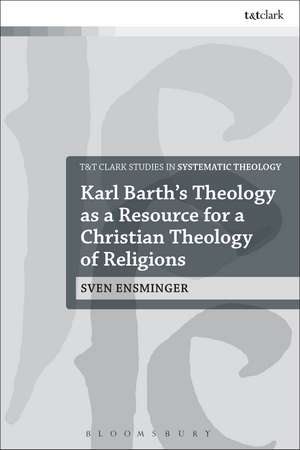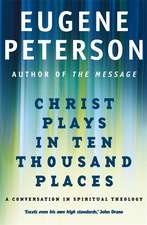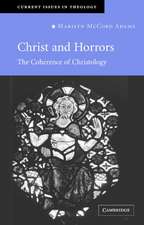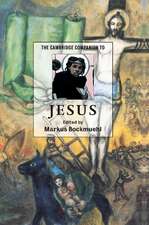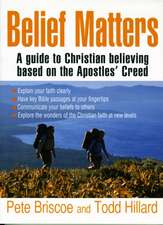Karl Barth’s Theology as a Resource for a Christian Theology of Religions: T&T Clark Studies in Systematic Theology
Autor Sven Ensmingeren Limba Engleză Paperback – 27 ian 2016
Din seria T&T Clark Studies in Systematic Theology
- 22%
 Preț: 225.67 lei
Preț: 225.67 lei -
 Preț: 495.46 lei
Preț: 495.46 lei - 22%
 Preț: 236.54 lei
Preț: 236.54 lei -
 Preț: 257.12 lei
Preț: 257.12 lei - 22%
 Preț: 597.37 lei
Preț: 597.37 lei - 13%
 Preț: 256.59 lei
Preț: 256.59 lei - 13%
 Preț: 257.97 lei
Preț: 257.97 lei - 21%
 Preț: 216.70 lei
Preț: 216.70 lei - 31%
 Preț: 889.88 lei
Preț: 889.88 lei -
 Preț: 257.03 lei
Preț: 257.03 lei - 13%
 Preț: 258.96 lei
Preț: 258.96 lei - 13%
 Preț: 257.59 lei
Preț: 257.59 lei - 13%
 Preț: 238.22 lei
Preț: 238.22 lei -
 Preț: 256.59 lei
Preț: 256.59 lei - 21%
 Preț: 217.17 lei
Preț: 217.17 lei - 22%
 Preț: 260.16 lei
Preț: 260.16 lei -
 Preț: 256.20 lei
Preț: 256.20 lei -
 Preț: 257.50 lei
Preț: 257.50 lei - 13%
 Preț: 224.58 lei
Preț: 224.58 lei - 22%
 Preț: 890.28 lei
Preț: 890.28 lei - 13%
 Preț: 258.42 lei
Preț: 258.42 lei - 22%
 Preț: 256.77 lei
Preț: 256.77 lei - 13%
 Preț: 258.69 lei
Preț: 258.69 lei - 22%
 Preț: 891.92 lei
Preț: 891.92 lei - 22%
 Preț: 232.72 lei
Preț: 232.72 lei - 31%
 Preț: 890.28 lei
Preț: 890.28 lei - 22%
 Preț: 256.95 lei
Preț: 256.95 lei - 23%
 Preț: 223.20 lei
Preț: 223.20 lei - 22%
 Preț: 257.41 lei
Preț: 257.41 lei - 14%
 Preț: 947.94 lei
Preț: 947.94 lei - 22%
 Preț: 949.17 lei
Preț: 949.17 lei - 22%
 Preț: 256.95 lei
Preț: 256.95 lei - 30%
 Preț: 775.02 lei
Preț: 775.02 lei
Preț: 257.97 lei
Preț vechi: 331.42 lei
-22% Nou
Puncte Express: 387
Preț estimativ în valută:
49.36€ • 51.67$ • 41.09£
49.36€ • 51.67$ • 41.09£
Carte tipărită la comandă
Livrare economică 31 martie-14 aprilie
Preluare comenzi: 021 569.72.76
Specificații
ISBN-13: 9780567666727
ISBN-10: 0567666727
Pagini: 272
Dimensiuni: 156 x 234 x 25 mm
Greutate: 0.39 kg
Ediția:NIPPOD
Editura: Bloomsbury Publishing
Colecția T&T Clark
Seria T&T Clark Studies in Systematic Theology
Locul publicării:London, United Kingdom
ISBN-10: 0567666727
Pagini: 272
Dimensiuni: 156 x 234 x 25 mm
Greutate: 0.39 kg
Ediția:NIPPOD
Editura: Bloomsbury Publishing
Colecția T&T Clark
Seria T&T Clark Studies in Systematic Theology
Locul publicării:London, United Kingdom
Caracteristici
Works with primary, as well as secondary sources that have not usually been considered in different areas, especially German sources
Notă biografică
Sven Ensminger (PhD, Bristol University, UK) is an Adjunct Teaching Fellow at the University of St. Andrews, UK
Cuprins
Introduction Chapter 1 1.1 Barth's Doctrine of Revelation1.2 Approaching the doctrine of Revelation1.3 The one revelation of Jesus Christ and other Revelations 1.4 Conclusion Chapter 2 2.1 Barth's Understanding of Revelation and Religion2.2 Approaching Barth's Understanding of Religion2.3 Analysis of §17 of Church Dogmatics2.4 Revisiting Revelation in the Context of Religion2.5 Conclusion Chapter 33.1 Barth's Theological Anthropology and Doctrine of Sin3.2 Approaching Barth's Theological Anthropology3.3 Barth's Doctrine of Sin3.4 ConclusionChapter 44.1 Barth's Doctrine of Election - The Electing God and the Elected Human Being4.2 Approaching the Doctrine of Election4.3 The Question of Universalism & Human Freedom4.4 Conclusion Chapter 55.1 Engaging the Inclusivist Paradigm - A Conversation between Karl Rahner and Karl Barth5.2 Outline of the Inclusivist Paradigm5.3 Engaging the Inclusivist Paradigm5.4 Conclusion Chapter 66.1 Engaging the Pluralist Paradigm - John Hick as Question and Challenge to Karl Barth6.2 Outline of the Pluralist Paradigm6.3 Engaging the Pluralist Paradigm6.4 Conclusion Chapter 7: Conclusion 7.1 Karl Barth's Theology as Resource for Christian Theology of Religions7.2 Barth's Theology in the Field of Christian Theology of Religions7.3 Barth's Theology of Religions - A New Approach7.4 Conclusion Bibliography
Recenzii
Ensminger's extrapolations [in Karl Barth's Theology as a Resource for a Christian Theology of Religions] provide the first steps for thinking with Barth for a theology of religions relevant for the third millennium, arguably what the Swiss theologian would have wanted the contemporary church to take up.
Ensminger's book offers much in the way of contributions to both Barth studies as a whole and the emerging conversation around Barth, religion, and non-Christian religions, in particular. Finally, one feature of Ensminger's text that establishes it as unique in the emerging body of scholarship on Barth and religion is Ensminger's attention to Barth as a decidedly pastoral theologian, thus locating Barth's thinking about religion amongst pastoral, rather than purely dogmatic, concerns.
Ensminger's work is an important contribution to the theology of religions conversation. It has the potential to re-engage Barthians in the conversation while encouraging scholars in the field to re-consider Barth as a resource.
A generally reliable piece of exposition. . Ensminger-and Barth-deliver handsomely.
In the theology of religions Barth fell out of favour for a time. In this book Sven Ensminger helps to re-establish Barth as a key, constructive and rigorous voice. He shows that Barth is able to defend and elaborate his own complex and unique Reformed theological vision regarding revelation and the 'religions'. Ensminger also takes Barth and puts him into useful dialogue with Hick and Rahner. This book will be helpful to Barth specialists as well as those who are concerned about Christian attitudes to other religions.
Sven Ensminger shows convincingly that Karl Barth's examination of 'religion' and his qualification of the non-christian religions cannot be classified simply as 'exclusivism'. In his thorough study he outlines Barth's multi-faceted doctrine of revelation and his understanding of religion. He takes Barth's theological anthropology and his doctrine of election into account and relates Barth's approach to Rahner's 'inclusivism' and Hick's 'pluralism'. The strength of the study lies in comprising a broad spectrum of Barth's works and in drawing on the original German texts. This enables Ensminger to correct some misunderstandings of Barth and sheds new light on his approach as a resource for the current debate on theology of religions.
Sven Ensminger has provided a valuable addition to the growing body of literature that draws upon Karl Barth's theology as a resource for a Christian understanding of other faiths. In particular, he argues that Barth is able to combine a commitment to the uniqueness of Jesus as the self-disclosure of God with an openness to the action of God outside the Christian religion. In overcoming some standard misreadings of Barth, Ensminger offers his work as an important resource for current debates about the relationship of Jesus to the religions of the world.
Ensminger's book offers much in the way of contributions to both Barth studies as a whole and the emerging conversation around Barth, religion, and non-Christian religions, in particular. Finally, one feature of Ensminger's text that establishes it as unique in the emerging body of scholarship on Barth and religion is Ensminger's attention to Barth as a decidedly pastoral theologian, thus locating Barth's thinking about religion amongst pastoral, rather than purely dogmatic, concerns.
Ensminger's work is an important contribution to the theology of religions conversation. It has the potential to re-engage Barthians in the conversation while encouraging scholars in the field to re-consider Barth as a resource.
A generally reliable piece of exposition. . Ensminger-and Barth-deliver handsomely.
In the theology of religions Barth fell out of favour for a time. In this book Sven Ensminger helps to re-establish Barth as a key, constructive and rigorous voice. He shows that Barth is able to defend and elaborate his own complex and unique Reformed theological vision regarding revelation and the 'religions'. Ensminger also takes Barth and puts him into useful dialogue with Hick and Rahner. This book will be helpful to Barth specialists as well as those who are concerned about Christian attitudes to other religions.
Sven Ensminger shows convincingly that Karl Barth's examination of 'religion' and his qualification of the non-christian religions cannot be classified simply as 'exclusivism'. In his thorough study he outlines Barth's multi-faceted doctrine of revelation and his understanding of religion. He takes Barth's theological anthropology and his doctrine of election into account and relates Barth's approach to Rahner's 'inclusivism' and Hick's 'pluralism'. The strength of the study lies in comprising a broad spectrum of Barth's works and in drawing on the original German texts. This enables Ensminger to correct some misunderstandings of Barth and sheds new light on his approach as a resource for the current debate on theology of religions.
Sven Ensminger has provided a valuable addition to the growing body of literature that draws upon Karl Barth's theology as a resource for a Christian understanding of other faiths. In particular, he argues that Barth is able to combine a commitment to the uniqueness of Jesus as the self-disclosure of God with an openness to the action of God outside the Christian religion. In overcoming some standard misreadings of Barth, Ensminger offers his work as an important resource for current debates about the relationship of Jesus to the religions of the world.
